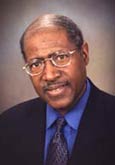By Ron Walters
-Guest Columnist-

- FCN Editorial – First Muslim member of U.S. Congress (FCN, 01-06-2007)
This session of Congress begins the career of Attorney Keith Ellison of Minneapolis, an African American who is also the first Muslim elected to the Congress, at a time when the U.S. is at war in the most Islamic region in the world. Yet, receiving his law degree from the University of Minnesota, practicing in Minneapolis and serving in the Minnesota House of Representatives, Ellison would appear to have substantial challenges of both race and religion, in his new role as a Congressman.
Ellison will be representing a district in the traditionally liberal Minneapolis, that is only 13 percent Black (23 percent “minority” altogether), where formerly liberals Hubert Humphrey and Martin Sabo held sway. And although, Sharon Belton an effective African American female, also served as mayor, it was arguably the late Minnesota Senator Paul Wellstone who was Ellison’s closest political role model—and he would often take visitors out to Senator Wellstone’s grave to make the point. Nevertheless, although Ellison won his election by a strong vote of 56 percent, backed by the dominant Democrat-Farm-Labor coalition, it will be his religion that may complicate his tenure in Congress the most.
 During his election campaign, Ellison was attacked by his Republican opponent Alan Fine (who subsequently won only 22 percent of the vote) for being a Muslim, alleging that he had a close association with Minister Louis Farrakhan. But more recently, Dennis Prager, a radio talk show host on the Salem network, complained that Ellison’s decision to take his private oath of office on the Holy Qur’an “undermines American civilization.” But in response, Ellison, who attended the Million Man March in 1995, did not disavow Minister Farrakhan, while noting that several other elected Members chose to take their oaths using books other than the Bible.
During his election campaign, Ellison was attacked by his Republican opponent Alan Fine (who subsequently won only 22 percent of the vote) for being a Muslim, alleging that he had a close association with Minister Louis Farrakhan. But more recently, Dennis Prager, a radio talk show host on the Salem network, complained that Ellison’s decision to take his private oath of office on the Holy Qur’an “undermines American civilization.” But in response, Ellison, who attended the Million Man March in 1995, did not disavow Minister Farrakhan, while noting that several other elected Members chose to take their oaths using books other than the Bible.
The most recent attack on Ellison was by U. S. Rep. Virgil Goode of Virginia, a conservative bible-belt Republican, who sent a letter to his constituents urging a Bush administration crack down on immigration and objecting to Ellison’s use of the Holy Qur’an, saying that unless Americans “wake up” there are “likely to be more Muslims elected to office and demanding the use of the Holy Qur’an.”
Ellison countered that he was not an immigrant and could trace his family’s origins back to 1742, but Rep. Goode persisted in an interview with FOX News, urging a restriction on immigration “so that we don’t have a majority of Muslims elected to the United States House of Representatives.” These comments by Rep. Goode have been denounced as intolerant, but they also appear ignorant, since he failed to spell out under what contorted logic Muslim immigrants could become a majority in the U. S. Congress.
Rep. Goode’s comments resembled the mean and ugly racial rhetoric of conservative politicians in the legislative fights of the early ‘90s. But despite their vehemence, Bill Clinton was re-elected in 1996 and in a seeming rebuke to his impeachment, the American public continued to support him.
The 2006 elections could also be interpreted as a repudiation of another radical conservative approach to governing. The reason Americans are in Iraq today is a manifestation of radical conservative doctrine of “pre-emption,” which served as a pretext to re-make the politics in the Middle East in the image of the U.S., that would allow increased access to its oil resources by a private cabal and enhance the security of Israel at the same time.
But Rep. Virgil Goode has apparently missed this rejection of radical conservatism, trying to use his popularity with his conservative base to elevate a radical view of immigration to the national level—by attacking Ellison. But I am betting that it won’t work.
Keith Ellison has a strong social justice streak and spoke to fellow Muslims in his native Detroit, recently, urging them to stand up and confront injustice in these perilous times, saying, “You can’t back down, you can’t chicken out, you can’t be afraid.”
On the other hand, he will concentrate on being an effective legislator and as such, has held out the hand of friendship to colleagues like Rep. Goode and encouraged them to learn more about Islam. As he said in his speech, “How do you know that you’re not here to teach this country?” Just as he won over his constituency in the Fifth Congressional District, it appears that he has the right stuff to do it in this new arena in the Congress.
(Ron Walters is Professor of Government and Politics at the University of Maryland, College Park.)












